Delhi: Havelis
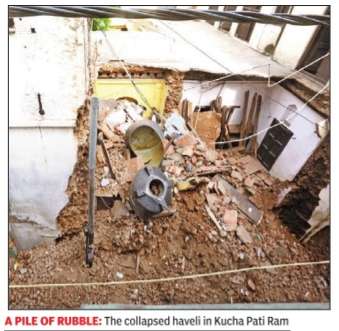
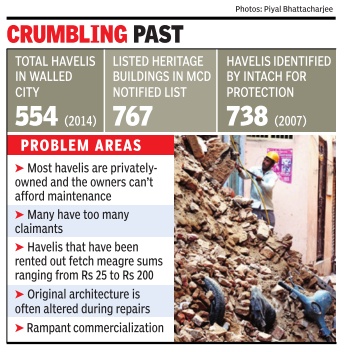
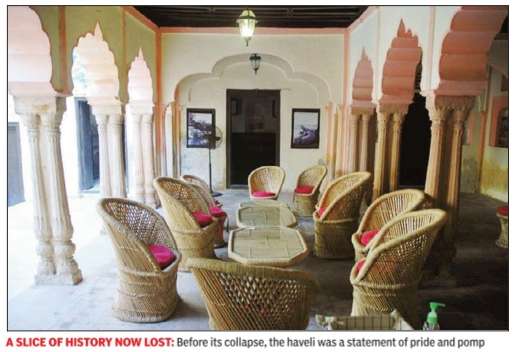
This is a collection of articles archived for the excellence of their content. |
Contents[hide] |
In brief
The Times of India, Aug 27 2015
Richi Verma
City's havelis losing fight against neglect and nature The 150-year old haveli in Kucha Pati Ram that collapsed wasn't iconic just for its vintage. It had served as the backdrop of movies like Tanu Weds Manu and TV shows like Bahadurshah Zafar (aired on Doordarshan in the late 1980s), and commemorative events celebrating the life and works of Mirza Ghalib were regularly held here. Celebrities like Gulzar and Vishal Bhardwaj, too, visited it apart from scores of tourists who routinely came here to study unique havelis of the Walled City.
“Most havelis in the Walled City date to the post Mughal era. This one was among the first few to be built in the Walled City . It had a huge courtyard and small rooms, while in most havelis it's the other way around,“ said Vijay Singh, former deputy commissioner (City Zone) and advisor of a heritage charitable society. He had adopted the haveli many years ago and had been working on showcasing the heritage of these old buildings.
The haveli doubled as an interpretation centre and had pictures, old maps and drawings on the interior walls showcasing its rich past. “It was a common destination for heritage walk guides. The large courtyard was an added incentive,“ said an official.
Civic officials were still clearing the rubble on Wednesday afternoon, and inspection of the haveli wasn't possible. But they said three rooms in the front portion had collapsed while the courtyard was intact.Corporation officials didn't comment on the reason for collapse, but sources said seepage due to recent rains had weakened the walls. Many havelis are wither ing away due to decades of neglect. Owners can't afford to maintain them while civic agencies have looked away . Also, the Shahjahanabad Redevelopment Corporation that was set up to protect Old Delhi's heritage is yet to come up with a plan to preserve these havelis.
Many years ago, MCD had notified 767 heritage buildings, but never took any steps to preserve them.In 2007, Intach came out with a separate list of 738 privately-owned heritage havelis needing protection.With the list pending notification with the UD department for years, the number got reduced to 554 in 2014.
Kucha Pati Ram is known for houses with amazing facades, mostly dating to the early or late 19th century and early 20th centu ry. “The styles echo those of earlier centuries and give you a glimpse of how attractive and prosperous an Old Delhi residence used to be, says a description of the lane. Sadly , one of these grand reminders is now lost.
The state of the havelis/ heritage properties
2018
Paras Singh, Heritage crumbles as ambitions go sky high, April 10, 2018: The Times of India
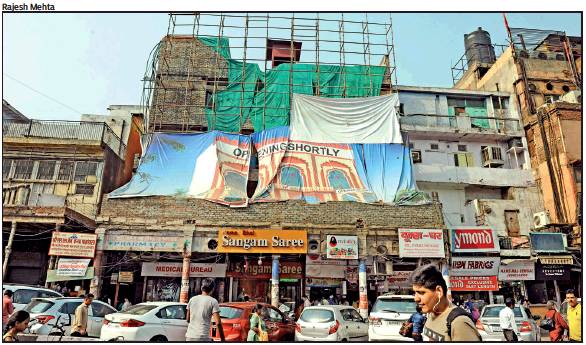
From: Paras Singh, Heritage crumbles as ambitions go sky high, April 10, 2018: The Times of India
A municipal corporation team visited some of the eight heritage properties in the Walled City recently on Delhi high court’s orders. The team was accompanied by the court-appointed amicus curiae Anil K Aggarwal and the petitioner as well. TOI tagged along with the team.
The team was led by commissioner Madhup Vyas and deputy commissioner Ruchika Katyal. The first stop was the Haksar Haveli, which is better known locally as Nehru haveli. The original structure is no longer present, just old lakhori brick walls. Five different shops are operating from there. A multistorey building covered with tarpaulin sheet right next to the site has become a contentious plot. Abdul Mueed, the owner of this property located near Sadak Prem Narayan said they were being unnecessarily targeted. “Why pick on just these properties? If the petitioner is so interested in heritage, why don’t they help in redeveloping the Haksar Haveli, which contains tonnes and tonnes of rubble? We will help them,” Mueed said. The builder has been booked for violation.
Down the road on Katra Dinanath near Chowasi Ghanta Mandir, a seven-storey building is coming up at ‘Rajmahal’ where once there were old structures with “mihrabs and jaalis”. The owner who didn’t wish to be named said the old building had kuchha construction and it had become too dangerous. But he didn’t answer why he was building seven floors.
A large number of houses in the neighbourhood have similar violations. Corporation officials from City-Sadar Paharganj zone said they would keep track of the violations. “Action under DMC Act has already been initiated against all these eight properties. Some have been ‘booked’ while demolition notices have been issued to others. We had carried out demolitions on March 16 as large scale unauthorised construction was going on there,” an official said.
At places, the team was surrounded by locals who also resorted to sloganeering.
Aggarwal said he was satisfied with the inspection. “The commissioner has now seen the construction and he has to take action as per the file on a case by case basis. At some properties he was little afraid that commotion may happen but that is understandable considering the environment,” Aggarwal said, adding that the team had also taken notice of the rampant unauthorised constructions at other properties and the court would be informed accordingly. “Taking action against a few properties here and there will not solve the problem. The court will have to go to the root cause of the problem,” Aggarwal said.
Sanjay Bhargava, president of Chandni Chowk Sarv Vyapar Mandal, spoke about the urgent need of action against rampant unauthorised constructions ruining Walled City’s heritage. “We have always been after Shahjahanabad Redevelopment Corporation to stop this. All the havelis are being destroyed, and the builder lobby is hand in glove with the corporation,” Bhargava said He added, “Foreigners don’t come to see CP-like markets but places like Chandni Chowk. But look at the mess.”
Most are unsafe
April 10, 2018: The Times of India
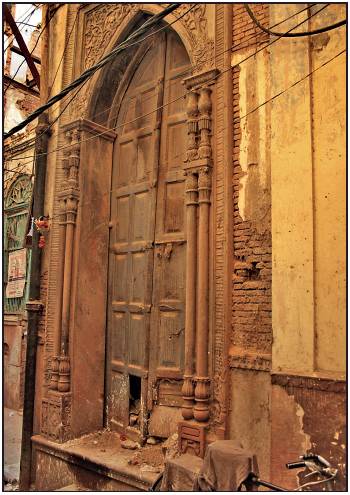
From: April 10, 2018: The Times of India
Of the eight properties listed by the Delhi high court for illegal construction April 4, Haksar Haveli in Sita Ram Bazaar and another haveli in Jogiwada are notified heritage properties. Another haveli at Churiwalan is listed for notification by Intach but is pending.
Notified or not, these buildings regularly suffer from neglect and unauthorised constructions. Haksar Haveli may have a rich history going back to Jawaharlal Nehru, but that hasn’t stopped vandals from targeting it. Only small portions of the haveli still stand today; much of its original grandeur has vanished through the years.
The erstwhile Municipal Corporation of Delhi had brought out a list of heritage properties in the Walled City. There were 757 buildings in that for notification, but very few buildings were havelis. So Intach came out with a second list of buildings for notification that had 551buildings that were mostly havelis. These were notified in 2016. A third list is pending notification.
“Most of these havelis are over a century old and need protection. Owners, however, either don’t want to cooperate or don’t have the means to do it. These havelis need to be preserved as many of them are being altered beyond recognition. A notified heritage building cannot be altered but few pay attention to the rules,” said a heritage expert.
Haksar Haveli was in the original 2010 list of MCD. Today, it’s possible to miss it completely. Most parts of the original building have either collapsed or been demolished through the years, and only a narrow lane for entry could be seen. Entry is restricted though locals all know the structure for being the famous Haksar Haveli where Nehru married Kamala Nehru.
The Jogiwada haveli was in the second list. “This haveli is largely in ruins and retains only its crumbling ground-floor facade. The building has an early colonial design with the use of an ornate entablature for its pointed arch entrance,” said an expert.
Many havelis are fading away like this despite growing awareness. “It doesn’t matter if a property is notified heritage building or not as the north corporation has failed to check violations. People are defacing buildings, constructing additional floors, altering the original design or simply letting the building fall to pieces because they can’t afford repairs,” said a resident of Kucha Pati Ram.
The high court order gives hope, nevertheless.
Some of the better-known havelis
Lahori Gate Haveli in Khari Baoli
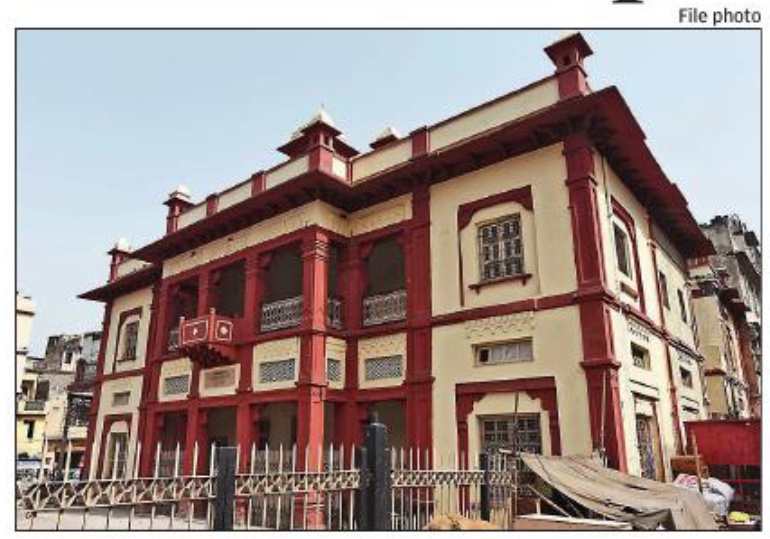
From: Vibha Sharma, Nov 10, 2023: The Times of India
See graphic:
Lahori Gate Haveli in old Delhi’s Khari Baoli is 95 years old, as of 2023
Vibha.Sharma adds: The haveli, located at the intersection of Khari Baoli and Naya Bazar known as Vasudev Captain Chowk, is a municipal property built in 1929. The structure, which served as a single-room dispensary till 2003, was restored and inaugurated in 2004. MCD has planned to establish a museum at the haveli to showcase the cultural diversity of Shahjahanabad, a city founded by Mughal emperor Shah Jahan in the mid-17th century
Shri Narayan Haveli (near Vasudev Captain Chowk)
Paras Singh, Restored in 2004, haveli to now serve as museum, May 17, 2018: The Times of India
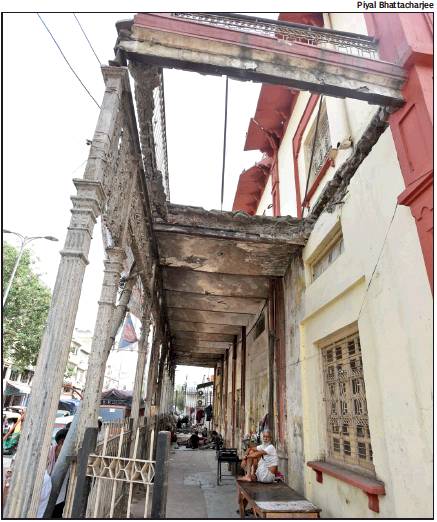
From: Paras Singh, Restored in 2004, haveli to now serve as museum, May 17, 2018: The Times of India
1929 Building To Display Walled City’s Heritage
Vasudev Captain Chowk is a busy intersection where roads branch off to Khari Baoli, Swami Sharaddhanand Marg and Naya Bazar. It is a typically chaotic part of Old Delhi, noisy and crowded. Amid the disorder, there might now be a reason to take a break and enter a noble, yellow and red-brown structure of some vintage. The building is a classic Shahjahanabad haveli, restored in 2004 but lying neglected and encroached since. It is now to transform into a museum showcasing the old culture of the Walled City.
North Delhi Municipal Corporation has started the process to hire experts and architects to redevelop the 1929-built heritage residence, informally called Shri Narayan Haveli. At the moment, several commercial outfits have taken over parts of the complex and the building itself shows signs of dilapidation, particular on its jharokhas and the roof. A corporation official, mandated to oversee the revival project, said, “The two-storey haveli had been under lock and key for over a decade. We have now started whitewashing the interiors and issued the tender for hiring cultural experts and architects.”
This haveli is a municipal property from where a one-room dispensary used to function prior to 2003. The restored structure was inaugurated in 2004, but nothing much changed beyond this. A dusty plaque declaring the building to be the ‘Walled City Museum’ and the cavernous, empty rooms are cruel reminders of a failed project.
When TOI visited the haveli on Wednesday, it found several encroachers like barbers, workers and others residing on the outer premises of the complex. A section of the ornate balcony facing the road to Khari Baoli had fallen off, while the decaying walls were covered by several illegal hoardings. The anterior portion of the structure had been recently whitewashed. Nanhe, a resident of the locality, informed, “The courtyard of the haveli served as a parking lot for shopkeepers and was cleared of the encroachments only a few days ago.”
Civic officials disclosed that artefacts, old pictures, books, paintings and a collection of items like old jharokhas and pillars from the Mughal era (Shahjahanabad post-1638) would be displayed in the new museum to make it a one-stop centre for people wanting a peek into Delhi’s historic past. A library and landscaping of the surroundings are also in the pipeline.
“We will also revive some of the plans from the 2004 project such as recreating glimpses of the Kinari Bazaar, the typical baithaks (drawing rooms) of havelis and the bangle markets of Old Delhi,” the official added. The financially strained corporation will fund the project using money allocated by the Union ministry of culture. “The overall project cost is around Rs 4 crore. We received the first instalment of Rs 80 lakh last year,” the official added.